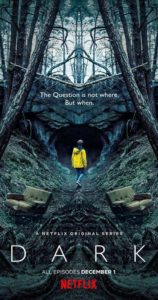 There’s this thing I have where I like time travel stories to make sense. I like them best when they adhere to certain strict logical parameters I won’t bore anyone with here, but these aren’t required. All that’s required is internal logic. For me to remain awake and interested. It’s kind of a rare thing. Time travel is a tricky business to wrap one’s head around, and many heads have failed to prove themselves up to the task. Does the future change if you change the past? Which future changes? Whose future changes? Yours? Someone else’s? Are you a new person when you return to where you came from? Or the same, but everyone else is different? Can you kill your parents in the past? Can you kill yourself? How about a butterfly? Should you drive over a butterfly in your DeLorean?
There’s this thing I have where I like time travel stories to make sense. I like them best when they adhere to certain strict logical parameters I won’t bore anyone with here, but these aren’t required. All that’s required is internal logic. For me to remain awake and interested. It’s kind of a rare thing. Time travel is a tricky business to wrap one’s head around, and many heads have failed to prove themselves up to the task. Does the future change if you change the past? Which future changes? Whose future changes? Yours? Someone else’s? Are you a new person when you return to where you came from? Or the same, but everyone else is different? Can you kill your parents in the past? Can you kill yourself? How about a butterfly? Should you drive over a butterfly in your DeLorean?
Dark, a new TV series, I was entirely tickled to discover last week, is a very smart story about time travel.
The first very smart thing Dark does is it takes the primary mindfuck of time travel—can you change the past such that a new future comes into being, or has the past already happened, including, possibly, your traveling back to it?—and uses it as a framework with which to explore how we are all of us—we here in the real world, without recourse to time machines—the inescapable products of what came before.
I heard tell prior to watching Dark that it was the German version of Stranger Things (Dark is, indeed, a German production funded by Netflix, which is what you’ll need to watch it), but this is like saying Das Boot is the German version of The Life Aquatic. Yes, they both feature submarines. Not, otherwise, similar. At all.
Whereas Stranger Things is a pseudo-Spielbergian, faux-‘80s story of bike-riding kid sleuths fighting a monster from an alternate reality, and is, at six hours long, four and a half hours of padding, Dark is a story of the people in a small German town haunted by their past, to which, it appears, a network of eerie caves beneath the local nuclear power plant may lead. It’s told over ten one hour episodes and, were it made into an American show, would require another two hours of story-time just to fit in all the extra exposition required to explain everything.
Which is to say, Dark is not spoon-fed to its audience. It requires what I refer to as plenty of brain-squinting. Where you feel like your brain is squinting to make sense of everything. It has to, because the show rarely spells out anything that happens. Once or twice it does you the favor of split-screening the faces of characters who appear in the past and the present, helping you keep them straight, but on the whole, Dark respects its audience enough to assume you’ll figure out what needs figuring. And you will. Even if, half the time, you’re saying, out loud, your whiskey sloshing over the rim of the glass, “Wait, is he the father of—No! He’s that guy’s son in the past, but—That girl, she’s the one who—or is she? Fuck!”
The more I think about it, the more impressed I am by how little is explained. At the end, though much is left unseen, everything makes sense. You understand what happened, how it happened, why it happened, and who made it happen, without half of what went down being made explicit. I was actually surprised to learn another season is in the works, so tied up is the story of season one. And then I realized, of course the show can go on—there are a hundred threads to follow. It’s just that you don’t need those threads followed to feel satisfied. The show makes sense as is. The show is complete as is. The ending is the only ending possible.
It’s a fine ending. Dark ends where and how it has to. I loved it for that. I feared it would go soft, that it wouldn’t follow through on its promise and its premise, on how the past must affect the future, and how the future must affect the past. It’s a dark ending, but to be fair, they warned you, didn’t they?
If there’s anything to nitpick about Dark, it’s its uninterrupted darkness. As I recall, there is exactly one gag (it involves a tattoo; you will laugh). But hey, what did you expect? It’s German, fer chrissakes. I found watching two episodes at once was the max I could take in one sitting. If you don’t mind stretching out your binge watching over at least five nights, you’ll be fine.
As for the story, it’s smart, it’s about people and their relationships to each other, and their relationships to the past. It begins (ends?) with a suicide. And a note. And a disappearance. At first it plays as a missing child police investigation. Then it gets weirder. Two peculiar, seemingly ageless men are glimpsed here and there, up to this and that, and why are there dead birds falling out of the sky?
No point in revealing more. It’s a compelling story, consistently mysterious until the end, even if you more or less understand what’s happening before you know you know what’s happening, even if, the moment the last scene begins, you know exactly where Jonas is, what the state of the world is, and who he’s going to meet. It could end no other way.

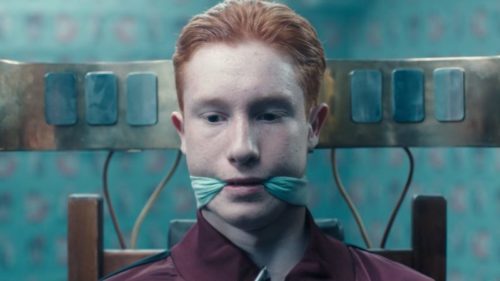
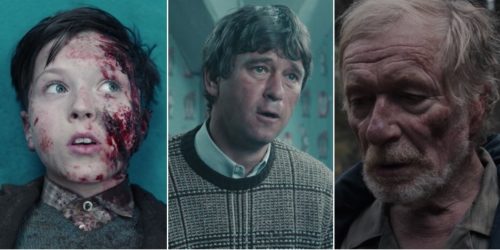
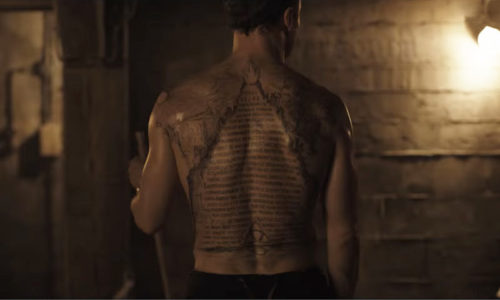
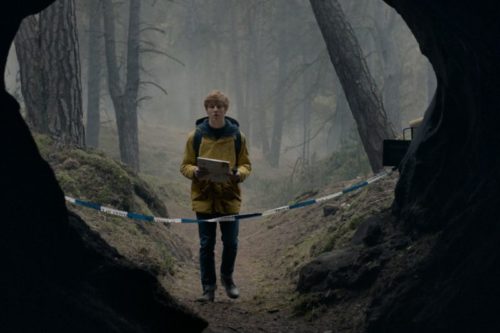
Perhaps I will watch this when I am done suffering through the vapid, wooden Altered Carbon, which I made the mistake of starting and now feel obliged to see through.
I loved Bill Murray in Das Boot!
I loved this show. It melted my brain and I loved it.
It’s nice when a story flatters me by expecting that I will be smart enough to understand what the fuck is going on. I’m actually quite stupid and I was running to keep up the whole time, holding on by the skin of my teeth, but holy shit it was worth it.
I have waited a few months and am about to go in for a second viewing, which I suspect will be even darker.
It is so very tempting to get Netflix just for the purpose of seeing this. There is a dearth of fascinating, brilliant, seriously creepy SF&F in my life since that one story in Ellison’s last short story collection (3 years ago; woe). Don’t suppose I’d be lucky enough for there to be any overtones of Ligotti in here (she asked, with wide, hopeful eyes)?
Well gosh, I like to consider myself well-read-ish, or at the very least, well-informed-ish, but I’d never before heard of Thomas Ligotti, so I can’t answer your question. But I can ask you one: what of Ligotti’s should I read first?
It’s worth it.
I think I forget that there might be any particular ‘great’ you and EG between you would not be familiar with (more on this in a moment*).
Ligotti, due to his reclusiveness, is known mostly to readers of literary horror, especially cosmic horror; he is, however, universally acknowledged as one of the greatest living horror writers (more on this in a moment, as well**). My favorite stories of his (so far) are ‘Last Feast of the Harlequin’, ‘Nethescuriel’, ‘The Frolic’, and ‘Vastarien’. A two-book compilation, “Songs of a Dead Dreamer/Grimscribe” was published by Penguin in 2015; it contains all of them. The ebook goes for $11 on Google Books.
Fair warning: Ligotti is one of the most nihilistic authors I’ve ever read. The meaninglessness that Nietzsche merely posited is the thread with which Ligotti weaves vast, shadowy tapestries–cloth in which any gleam of light urns out to be a taunt from a malignant universe. But the warp and weft of his fabric are impeccably crafted, and at times exquisitely beautiful.
*You and EG are two of the most erudite writers I know, SB–I wasn’t joking about that. Your mastery being of a canon not comprised of written words doesn’t change that. That’s a big part of why I love reading your blog–this is a metier I’ve barely begun to study, and I learn from you constantly.
**The New York Times Review of Books’ comments on Ligotti come to me whenever I attempt to describe him: “…With Ligotti [giving the story away] matters rather less than it would with, say, Stephen King. King, the great entertainer, needs the story as the comedian needs the joke, and when he can’t quite deliver it he dies (in the comedian’s sense). King is a master of horror, though. When inspiration fails, he has the technique to fake it. Thomas Ligotti is a master of a different order, practically a different species. He probably couldn’t fake it if he tried, and he never tries. He writes like horror incarnate.”
-Terrence Rafferty, 11/01/15
Aw, heck. You’re too kind. As ever, me and the ol’ Evil Genius get a thrill pointing people to movies they’d never have known about otherwise.
Thanks for the heads up on Ligotti. I’m fine with bleak and nihilistic and Lovecraftian. Really, I’m fine with anything so long as the writing’s good.